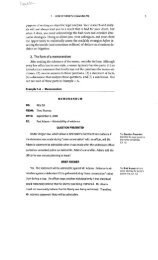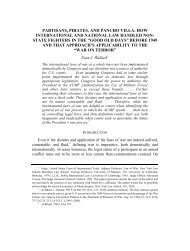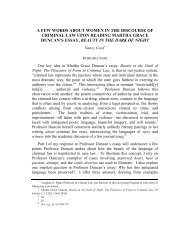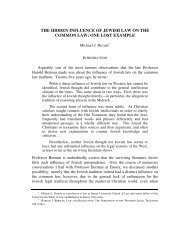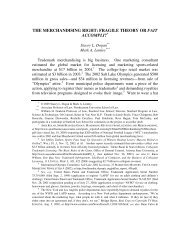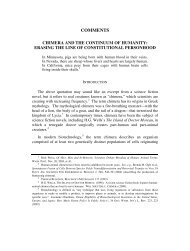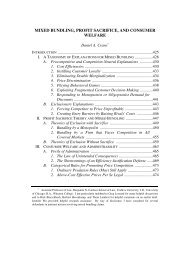life, liberty, and the pursuit of swords and armor - Emory University ...
life, liberty, and the pursuit of swords and armor - Emory University ...
life, liberty, and the pursuit of swords and armor - Emory University ...
Create successful ePaper yourself
Turn your PDF publications into a flip-book with our unique Google optimized e-Paper software.
1318 EMORY LAW JOURNAL [Vol. 57<br />
C. Existing Criminal Legal Provisions Governing Property Are Sufficient to<br />
Regulate <strong>the</strong> Theft <strong>of</strong> Virtual Goods.<br />
A number <strong>of</strong> current statutory provisions recognize <strong>the</strong> <strong>the</strong>ft <strong>of</strong> a virtual<br />
item as legally cognizable <strong>the</strong>ft. This section discusses <strong>the</strong> various current<br />
statutory provisions that might be relevant or useful. First, this Comment<br />
looks at specific provisions to determine whe<strong>the</strong>r <strong>the</strong> <strong>the</strong>ft <strong>of</strong> virtual goods<br />
could be regulated through <strong>the</strong>se existing provisions. Then, this Comment<br />
tackles <strong>the</strong> unique issues that arise when trying to apply any <strong>of</strong> <strong>the</strong>se model<br />
<strong>and</strong> penal statutes to virtual goods, such as jurisdiction, identification,<br />
transactional costs, contractual barriers, <strong>and</strong> privacy concerns.<br />
1. The Applicability <strong>of</strong> Current Statutory Provisions<br />
Having determined that virtual goods are protectable property <strong>and</strong> should<br />
be granted certain property rights, this Comment now attempts to fit <strong>the</strong> <strong>the</strong>ft<br />
<strong>of</strong> <strong>the</strong>se virtual goods within <strong>the</strong> following <strong>the</strong>ft provisions as provided by <strong>the</strong><br />
MPC: unlawful taking, <strong>the</strong>ft by deception, <strong>and</strong> embezzlement. Although each<br />
state has different <strong>the</strong>ft statutes, many states have modeled sections <strong>of</strong> <strong>the</strong>ir<br />
penal codes on <strong>the</strong> MPC. 125 Thus, this Comment limits its analysis to <strong>the</strong><br />
language <strong>of</strong> <strong>the</strong> MPC for <strong>the</strong> sake <strong>of</strong> clarity <strong>and</strong> efficiency. 126<br />
a. Unlawful Taking or Disposition<br />
Under <strong>the</strong> MPC, a person is guilty <strong>of</strong> <strong>the</strong>ft by unlawful taking or<br />
disposition if “he unlawfully takes, or exercises unlawful control over,<br />
movable property <strong>of</strong> ano<strong>the</strong>r with purpose to deprive him <strong>the</strong>re<strong>of</strong>.” 127<br />
Theoretically, this definition would fit <strong>the</strong> <strong>the</strong>ft <strong>of</strong> virtual goods through<br />
phishing scams, where <strong>the</strong> hacker unlawfully takes or exercises unlawful<br />
control over <strong>the</strong> virtual goods <strong>of</strong> ano<strong>the</strong>r with <strong>the</strong> purpose <strong>of</strong> depriving <strong>the</strong><br />
lawful owner <strong>of</strong> his virtual good. This definition would also criminalize <strong>the</strong><br />
actions <strong>of</strong> a person who uses an unbeatable bot 128 to extract property from<br />
o<strong>the</strong>rs, 129 considering that <strong>the</strong> person using <strong>the</strong> bot is unlawfully taking or<br />
125 Lynch, supra note 96, at 297.<br />
126 For an explanation <strong>of</strong> <strong>the</strong> MPC’s definition <strong>of</strong> property, see supra text accompanying notes 97–101.<br />
127<br />
MODEL PENAL CODE § 223.2(1) (2006).<br />
128 See supra text accompanying note 52.<br />
129 It might be possible to argue that because force is used in this situation, robbery, instead <strong>of</strong> <strong>the</strong>ft, has<br />
occurred. See State v. Smalls, 708 A.2d 737 (N.J. Super. Ct. App. Div. 1998) (finding that crime <strong>of</strong> <strong>the</strong>ft<br />
becomes robbery, in part, when defendant inflicts bodily injury or uses force upon ano<strong>the</strong>r in course <strong>of</strong>



